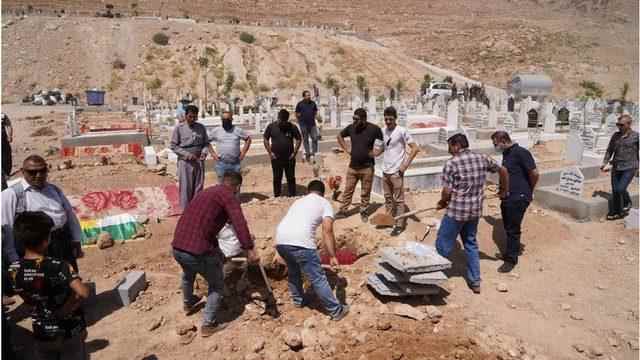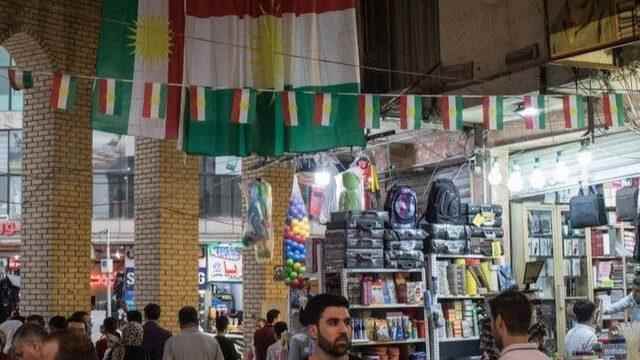Most of the 27 migrants, men and women, who lost their lives while trying to cross the English Channel between France and England with inflatable boats, are thought to have come from the Kurdistan region of Iraq.
Again, in recent weeks, most of those who lost their lives in the freezing winter conditions on the Belarus-Poland border, where hundreds of immigrants are trying to cross into the European Union (EU), were Iraqi Kurds.
This raises the question of why so many people risk their lives by leaving the autonomous region of Kurdistan, known as the oil-rich, relatively safe and stable region of Iraq.
Most Iraqi Kurds, trapped in refugee camps on the English Channel in northern France or on the Belarus-Polish border, report that they set off to seek better living conditions due to economic difficulties in their homeland.
Immigrants say that unemployment is very high, wages are very low, salaries are not paid, and public services are very poor.
They talk about the prevalence of bribery and corruption, and the difficulty of existing outside the networks of political extensions and tribes of the Barzani and Talabani families, who have been sharing power in the region for almost 30 years.
A young Kurdish refugee from a refugee camp in Dunkirk tells Pishti News agency, “There is no hope in Kurdistan. All young people have to migrate, except those who have the support of the ruling parties.”
A young woman from the same camp says that her husband served as a Peshmerga in the security forces for years, but they had to immigrate to Europe after months of not being paid.
“If we only get to England then we can hope for a better life for our children,” he says.
Economic crisis in the Kurdistan region
The population of the Kurdistan region of Iraq is just over 5 million, of which 1.3 million receive state salaries.
The Kurdistan Regional Government reduced the salaries of public employees by 21 percent last year, and could not pay the salaries of civil servants for months afterwards. Many families were in a difficult situation.
Behind the crisis were the financial crisis caused by the coronavirus epidemic, the global drop in oil prices, and the disagreements with the central Iraqi government in Baghdad over budget appropriations.
In July of this year, the cut in civil servants’ salaries was abolished and reinstated, but it is not clear how much of the accumulated receivables of public employees will be paid.
Oil prices have risen again and the region’s economy is resurgent, but unemployment, low wages and poverty are still causing widespread protests.
This week, thousands of university students took to the streets in the two largest cities, Erbil and Sulaymaniyah. These students demanded that their monthly student scholarships be reinstated, which was suspended due to the war against ISIS and the drop in oil prices.
Speaking to the French News Agency AFP, a student said, “There are students in different regions who cannot afford to travel to their homes. There are students who cannot eat three meals a day.”
Some of the demonstrations were eventful, with some groups setting fire to official and political party buildings. Security forces detained dozens of students.
The government’s response to the opposition has also been criticized.
In May, the United Nations (UN) reported that journalists, human rights volunteers, and those who criticize, question, and protest officials faced not only threats, but also lawsuits and convictions for restriction of freedom of movement, unwarranted detentions, even national security threats or insults.
The impact of the conflict between Turkey and the PKK
Some of the migration from the Kurdistan Region is thought to be due to the escalating tensions in the north on the Turkish border.
It is reported that there are hundreds of people from Şiladze and Deralok, two cities in the northern Duhok province, who have been trying to cross the EU border through Belarus since spring.
There are PKK camps in the mountainous region on the Turkey-Iraq border, which have been listed as a ‘terrorist organization’ by the EU, the USA and the UK, and it has been reported that the Turkish army has intensified its air strikes against PKK positions and senior commanders in this region since April.

While Iraqi Kurdish officials said that civilians were also killed in Turkey’s attacks, the PKK was also blamed for the deaths of many Peshmerga fighters in the region.
Last month, a Kurdish person from Şiladze, whose 19-year-old son immigrated to Germany, told Reuters agency, “Our region is surrounded by PKK and Turks. Our lands are beautiful, but we are afraid and do not feel confident to stay here.”
Iraqi Kurdistan Regional Government Prime Minister Masrour Barzani, commenting on the migration wave of Kurds to Europe in recent months, said that it is not an immigration problem, it is a human smuggling problem of criminal organizations, and noted that people are deceived by gangs and they are in the middle of a conflict between Belarus and the EU.
Addressing European countries, Barzani called for the prevention of human smugglers and the increase of investments and financial support for reforms in order to open new business areas in the KRG.
Masrour Barzani also stated that they are hosting around 1 million Iraqis and 200,000 registered Syrian refugees who were forced to internally migrate due to the three-year war with ISIS, adding that this situation puts pressure on health, education and public services, and that the region should be supported in this regard.
